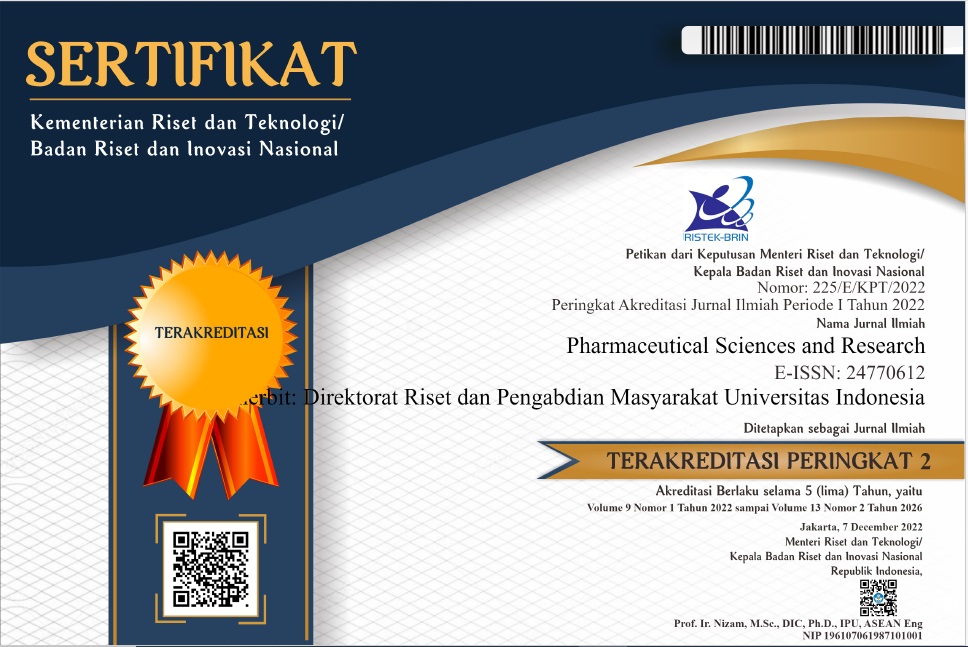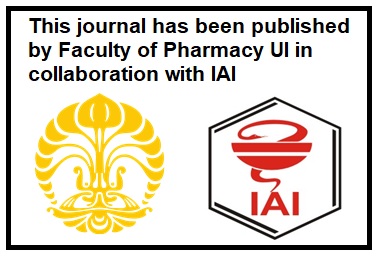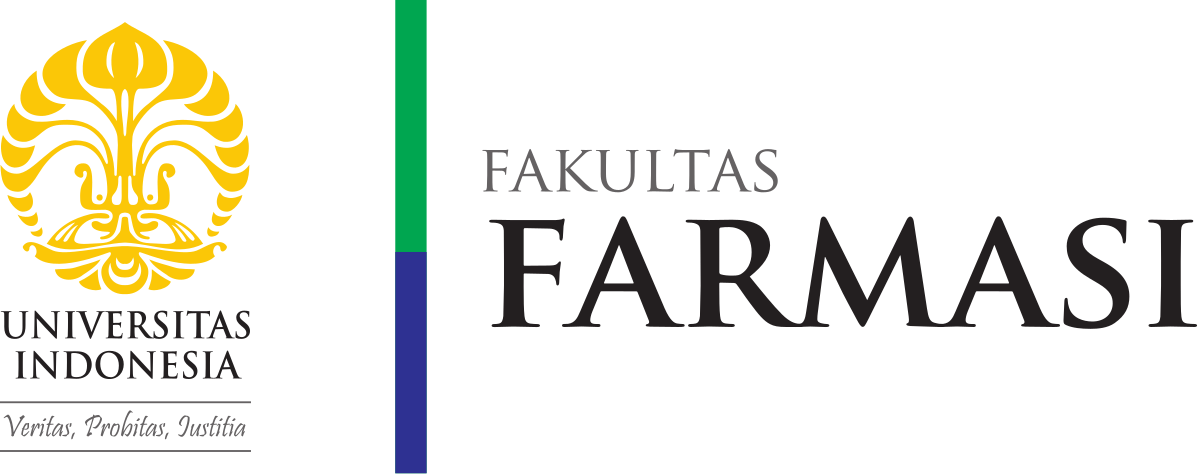Abstract
It has been reported that peel of Punica granatum has antidyslipidemic activity. The aim of this research was to investigate the antidyslipidemic activity of Punica granatum leaf. The dried Punica granatum leaves were extracted with 96% ethanol. Rats were divided into several groups, which were normal, positive control, simvastatin at a dose of 10 mg/kg bw as reference group, and Punica granatum extract at a dose of 100 mg/kg. Before treatment, male Wistar rats were fed with high cholesterol chow for 3 months, and then plant extract was given for 4 weeks. Blood samples were collected at week 0, 12, 14, and 16 to measure the levels of total cholesterol, high-density lipoprotein (HDL)-cholesterol, low-density lipoprotein (LDL)-cholesterol, and triglyceride. Furthermore, at the last day of extract treatment, the aorta was isolated and haematoxylin-eosin stained. Administration of ethanol leaf extract of Punica granatum at a dose of 100 mg/kg for 2 weeks significantly reduced the total cholesterol and LDL-cholesterol levels up to 27.6% and 34.79%, respectively, compared to positive control group. After 4 weeks of extract treatment, the reduction of total cholesterol and LDL-cholesterol level were up to 59.9% and 75.05%, respectively. There was no effect of extract on HDL-cholesterol and triglyceride level. Furthermore, histological study showed that ethanol extract of P. granatum reduced aortic wall thickness significantly compared to untreated group. Punica granatum leaf is potential to be developed as an antidyslipidemic drug.
References
Abaas, I., Hamzah, M., Ali, A.J. (2014). Extraction, identification, and antifungal studies of leaves extract of Punica granatum L. World Journal of Pharmacy and Pharmaceutical Sciences, 3(3), 190-202.
Abd El-Mageid, M. M., Salama, A. R., Saleh, M. A. M., & Abo-Taleb, H. N. (2016). Evaluation of antidiabetic, hypocholesterolemic of pomegranate (Punica granatum L.) juice powders and peel powder extracts in male albino rats. IOSR Journal of Pharmacy and Biological Sciences, 11, 53-64.
Bhaskar, A., & Kumar, A. (2012). Antihyperglycemic, antioxidant and hypolipidemic effect of Punica granatum L flower extract in streptozotocin induced diabetic rats. Asian Pacific Journal of Tropical Biomedicine, 2(3), S1764-S1769.
Das, S., & Barman, S. (2012). Antidiabetic and antihyperlipidemic effects of ethanolic extract of leaves of Punica granatum in alloxan-induced non–insulin-dependent diabetes mellitus albino rats. Indian Journal of Pharmacology, 44(2), 219.
Esmaillzadeh, A., Tahbaz, F., Gaieni, I., Alavi-Majd, H., & Azadbakht, L. (2004). Concentrated pomegranate juice improves lipid profiles in diabetic patients with hyperlipidemia. Journal of Medicinal Food, 7(3), 305-308.
Hall JE, Guyton. (2016). Textbook of medical physiology (13th ed.). Philadelphia: Elsevier. 829.
Huang, T. H., Peng, G., Kota, B. P., Li, G. Q., Yamahara, J., Roufogalis, B. D., & Li, Y. (2005). Anti-diabetic action of Punica granatum flower extract: activation of PPAR-γ and identification of an active component. Toxicology and Applied Pharmacology, 207(2), 160-169. doi: 10.1016/j.taap.2004.12.009
Jafri, M. A., Aslam, M., Javed, K., & Singh, S. (2000). Effect of Punica granatum Linn.(flowers) on blood glucose level in normal and alloxan-induced diabetic rats. Journal of Ethnopharmacology, 70(3), 309-314.
Jasuja, N. D., Saxena, R., Chandra, S., & Sharma, R. (2012). Pharmacological characterization and beneficial uses of Punica granatum. Asian Journal of Plant Sciences, 11(6), 251.
Jurenka, J. (2008). Therapeutic applications of pomegranate (Punica granatum L.): a review. Alternative Medicine Review, 13(2).
Kolovou, G. D., Anagnostopoulou, K. K., & Cokkinos, D. V. (2005). Pathophysiology of dyslipidaemia in the metabolic syndrome. Postgraduate Medical Journal, 81(956), 358-366.
Lei, F., Zhang, X. N., Wang, W., Xing, D. M., Xie, W. D., Su, H., & Du, L. J. (2007). Evidence of anti-obesity effects of the pomegranate leaf extract in high-fat diet induced obese mice. International Journal of Obesity, 31(6), 1023-1029.
Li, Y., Wen, S., Kota, B. P., Peng, G., Li, G. Q., Yamahara, J., & Roufogalis, B. D. (2005). Punica granatum flower extract, a potent α-glucosidase inhibitor, improves postprandial hyperglycemia in Zucker diabetic fatty rats. Journal of Ethnopharmacology, 99(2), 239-244.
Marounek, M., Volek, Z., Skřivanová, E., & Czauderna, M. (2012). Gender-based differences in the effect of dietary cholesterol in rats. Central European Journal of Biology, 7(6), 980-986.
National Institute of Health Research and Development, Ministry of Health, Republic of Indonesia (2013). Indonesia Basic Health Research, 258-260.
Nurfatwa M. (2016). Evaluasi ekspresi myeloperoksidase dan CD68 pada aorta dan jantung tikus hiperkolesterolemia [thesis]. Bandung: Sekolah Farmasi ITB
Patel, A. N., Bandawane, D. D., & Mhetre, N. K. (2014). Pomegranate (Punica granatum Linn.) leaves attenuate disturbed glucose homeostasis and hyperglycemia mediated hyperlipidemia and oxidative stress in streptozotocin induced diabetic rats. European Journal of Integrative Medicine, 6(3), 307-321.
PERKI. (2013). Pedoman tatalaksana dislipidemia. 1st ed. Jakarta: Centa Communications. 1-2.
Rahmani, A. H., Alsahli, M. A., & Almatroodi, S. A. (2017). Active constituents of pomegranates (Punica granatum) as potential candidates in the management of health through modulation of biological activities. Pharmacognosy Journal, 9(5).
Rizos, C. V., Elisaf, M. S., & Liberopoulos, E. N. (2011). Effects of thyroid dysfunction on lipid profile. The Open Cardiovascular Medicine Journal, 5, 76.
Sadeghipour, A., Eidi, M., Ilchizadeh Kavgani, A., Ghahramani, R., Shahabzadeh, S., & Anissian, A. (2014). Lipid lowering effect of Punica granatum L. peel in high lipid diet fed male rats. Evidence-Based Complementary and Alternative Medicine, 2014. doi: 10.1155/2014/432650
Safitri, D., Kurniati, N. F., Adharani, S., Suciyati, S. W., & Adnyana, I. K. (2016). The study of red ginger rhizomes ethanol extract (zingiber officinale roscoe var. Sunti val.) on hyperlipidemic-induced rats. Pharmacologyonline, 3, 15-21.
Salwe, K. J., Sachdev, D. O., Bahurupi, Y., & Kumarappan, M. (2015). Evaluation of antidiabetic, hypolipedimic and antioxidant activity of hydroalcoholic extract of leaves and fruit peel of Punica granatum in male Wistar albino rats. Journal of Natural Science, Biology, and Medicine, 6(1), 56.
Sukandar, E. Y., Safitri, D. E. W. I., & Aini, N. N. (2016). The study of ethanolic extract of binahong leaves (Anredera cordifolia [Ten.] Steenis) and mulberry leaves (Morus nigra L.) in combination on hyperlipidemic-induced rats. Asian Journal of Pharmaceutical and Clinical Research, 9(6), 288-98.
Suo, J. L., Peng, Y., Zhang, Z. Y., & Wang, M. L. (2009). Studies on the optimum extraction and antioxidative activity of total flavonoids from Punica granaturn leaves. Biotechnology, 19, 63-65.
Yang, R. L., Shi, Y. H., Hao, G., Li, W., & Le, G. W. (2008). Increasing oxidative stress with progressive hyperlipidemia in human: relation between malondialdehyde and atherogenic index. Journal of Clinical Biochemistry and Nutrition, 43(3), 154-158.
Recommended Citation
Kurniati, Neng Fisheri; Garmana, Afrillia Nuryanti; and Sakinah, Lia Nurul
(2021)
"The Effect of Ethanol Extract of Punica granatum Linn. Leaves on Lipid Profiles of Dyslipidemic Rat,"
Pharmaceutical Sciences and Research: Vol. 8:
No.
2, Article 4.
DOI: 10.7454/psr.v8i2.1106
Available at:
https://scholarhub.ui.ac.id/psr/vol8/iss2/4
Included in
Natural Products Chemistry and Pharmacognosy Commons, Other Pharmacy and Pharmaceutical Sciences Commons, Pharmaceutics and Drug Design Commons








